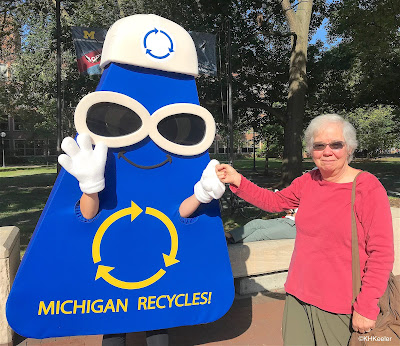Recycling is on my mind because a National Public Radio (NPR) study (link) last month found that plastic recycling is basically not happening; most of the plastic goes to landfills. And always has. What? I am a believer in recycling.
Studying at the University of Michigan, in 1968 I took my first ecology course. The class included "cycles," how carbon, nitrogen, water--every element and molecule--move through our world. One of the examples was aluminum, which is found in moderate amounts in the earth but was rapidly being mined to make aluminum cans and other materials. The cycle showed aluminum going increasingly to landfills. I embraced recycling then because it made sense to me that if we didn't gather used aluminum and reuse it, the aluminum would become ever harder and more expensive to produce. Post-human use simply needed to be linked into the cycles. By us, not by waiting thousands of years for natural processes to break down the cans.
But recycling isn't simple. Many of our products are complex, containing perhaps aluminum, plastic, iron, and things that we don't know how to recycle. They have to be collected, separated, and processed. For the most part, it is cheaper to use new materials. People and governments subsidize recycling and using recycled material is good public relations for corporations, creating some profit on something that is basically a service. The economics work better in cities, where lots of people create a concentrated waste stream. In rural areas, the cost of collection quickly exceeds any profit. Yet, if we manufacture without recycling, there will come a time when we will have to search landfills for materials for industry.
I've recycled as a matter of principle for 60 years. I somehow thought we were particularly cool in the U.S. for recycling. Certainly when I traveled in the 70s, 80s and 90s I didn't see much recycling outside the U.S., but I probably I didn't see much in the U.S. then, either.
My traveling increased beginning about 2006. I found recycling difficult during travel. In 2006 I did not find recycling in hotels (it was common by 2019). Frequently there were no recycling bins visible in train stations or by museums when I wanted to dispose of something (in Europe there were no waste bins, either, to prevent bombs hidden there). The first pictures I have of recycle bins are from 2014. Majorca had bins for organic and inorganic waste, recyclable and non recyclable. Lisbon had plastic, metal, and glass, and elsewhere, cardboard. I began noticing recycling.
 |
| In Majorca, Spain |
In the United States, recycling rules differ and knowing what to recycle and what to put in the trash is complicated. Having the instructions in a language you don't know makes it harder to choose between bins. I reflect when traveling that I''m fortunate that English is so widely used, that so many languages use our Roman letters, and that many words in recycling are cognates.
 |
| In Portugal |
 |
| In northern Japan |
Beginning in 2015, I photographed recycling bins. I saw recycling in China, Belgium, Germany and Australia that year. Obviously it was world-wide.
 |
| Alice Springs, Australia 2015 |
Many were ordinary trash bins, labeled for recycling
 |
| In Toronto, Canada |
But some had quite sophisticated designs:
 |
| In Toronto, Canada |
 |
| In Stockholm, Sweden |
 |
| In Suzhou, China |
 |
| Aluminum cycle with recycling |
 |
| Supporting U. Michigan recycling, Sept. 2019 |
Kathy Keeler, A Wandering Botanist
More at awanderingbotanist.com
Join me on Facebook: https://www.facebook.com/AWanderingBotanist


this is a very interesting article, I've recycled as much as I can since I was a student back in the late 80s, when there were a few recycling bins in Edinburgh. It's increased a lot since then but it's frustrating that different parts of Edinburgh even have slightly different arrangements for what can be recycled and how. It is good to know though that our city does actually do good things with what it claims to recycle, though the information is quite difficult to find. Reducing consumption is as important as recycling of course too.
ReplyDeleteFifty years ago, my last year in high school, I spoke to the City Council of our small town about the importance of recycling ... not much interest. The Coors distributor took aluminum cans then, but that was it. Now the town is a city, and they have weekly pickup. On good days I think we've come so far. But then I read how far we still have to go ... sigh.
ReplyDeleteGreat job done! hope we have these type of recycle been soon.
ReplyDeleteNice article. have some resources. You may like these.
ReplyDeleteReasons to Buy Peanuts from India and
All about Chlorinated Paraffin & the Industry and
Benefits of Choosing The Best Chlorinated Paraffin Manufacturers and
How to buy herbs and
How Different Spices Available in the Kitchen Help You in CORONA?
It's clear that you've done your research and have a deep understanding of the subject. The examples you provide highlight the need for innovative solutions and a shift in our perspectives. Your call to action to educate ourselves and actively engage in sustainable practices is something we should all take to heart.
ReplyDeletecan i use a walmart gift card for gas
My bookmarks have a special place for your blog. I value the time and work you put into providing insightful articles. asus student discount
ReplyDeleteThis comment has been removed by the author.
ReplyDeleteThank you for giving your thoughts and simplifying difficult subjects. Your writing is a real strength.fresh choice coupon
ReplyDeleteCool thought
ReplyDelete